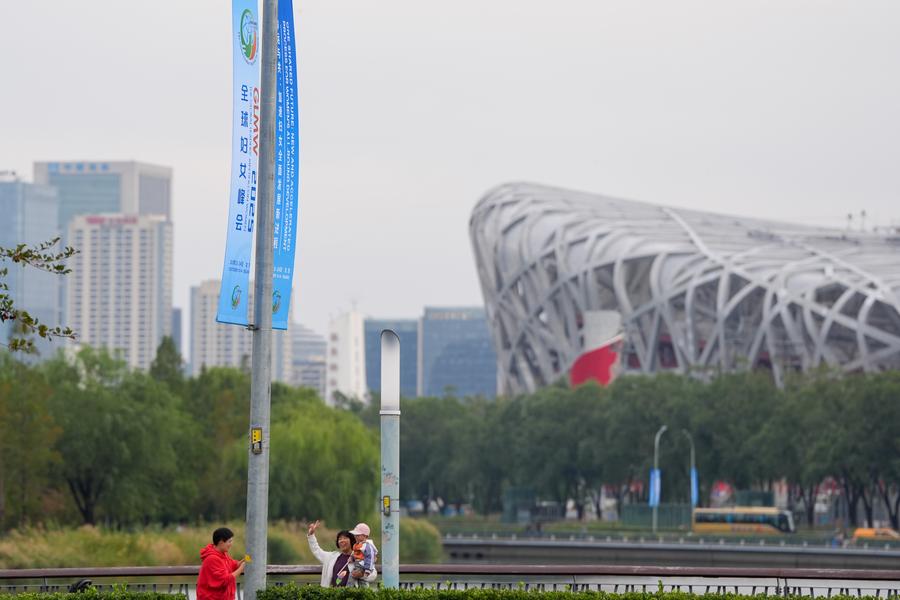 Street banners for the Global Leaders' Meeting on Women are pictured in Beijing, on Oct 11, 2025. [Photo/Xinhua]
Street banners for the Global Leaders' Meeting on Women are pictured in Beijing, on Oct 11, 2025. [Photo/Xinhua]
At the openingCILIBA 磁力猫 of the Global Leaders' Meeting on Women in Beijing on Monday, President Xi Jinping reaffirmed China's firm commitment to promoting gender equality and women's empowerment — not only within its own borders but across the world, especially among developing nations. As Xi noted, women play an important role in creating, promoting and carrying forward human civilization, and the international community has a shared responsibility to advance the cause of women.
Thirty years after the landmark 1995 Beijing World Conference on Women, Xi's speech offered both a review of the global progress of the women's cause and a blueprint for the next stage. It reflected how far China has come since that historic meeting — and how much further it is prepared to go in partnership with the world to accelerate the comprehensive development of women.
Indeed, China is not only a sayer but, more importantly, a doer. The white paper titled "China's Achievements in Women's Well-Rounded Development in the New Era", released by the State Council Information Office ahead of the meeting, details the remarkable progress the nation has made.
Over the past decade, the sense of fulfillment, happiness and security among Chinese women has reached an unprecedented level. China has built an institutional system of laws, regulations and policies to help combat gender-related violence and discrimination, ensure equal access to education and health services, and promote women's participation in all sectors of life.
Riding the wave of the digital economy, "she power" has become a vibrant new force: more than half of China's internet entrepreneurs are women, one-third of the digital trade and livestreaming workforce are female, and in 2024 alone, over 14,000 women were certified as AI trainers.
China's experience demonstrates that promoting gender equality must be integrated into socioeconomic development. True fairness lies not only in outcomes but also in procedures — in creating an enabling environment where women have equal opportunities to pursue their dreams and shape their own futures. That is also an important attribute of China's people-centered development.
At the global level, China has proved to be a steadfast partner. Over the past years, working closely with UN agencies, it has expanded its cooperation network to more than 140 countries and 420 women's organizations and institutions. China has also invested over $40 million in women's empowerment projects across 20-plus countries, trained more than 200,000 women from over 180 countries and regions, and provided employment support to women in more than 100 countries. It has advanced women's participation in peacekeeping, disaster relief and global governance, while incorporating gender cooperation into the Belt and Road Initiative and South-South cooperation frameworks.
China's new commitments at the Beijing meeting take these efforts to an even higher level. In the next five years, China will donate another $10 million to UN Women; earmark a quota of $100 million in China's Global Development and South-South Cooperation Fund for implementing development cooperation projects for women and girls in collaboration with international organizations; launch 1,000 "small and beautiful" livelihood programs with Chinese assistance that take women and girls as priority beneficiaries; invite 50,000 women to China for exchange and training programs; and establish a Global Center for Women's Capacity Building, which is aimed at conducting capacity building and other development cooperation with relevant countries and international organizations to train more female talent.
Equally important are Xi's four proposals to advance women's development worldwide, namely: Countries should jointly foster an enabling environment for women's growth and development; cultivate powerful momentum for the high-quality development of the women's cause; develop governance frameworks to protect women's rights and interests; and write a new chapter in promoting global cooperation on women.
These are not only a summary of past experience but a road map for the future — one that calls for action tailored to national conditions. Promoting women's development is a collective endeavor that requires all stakeholders to move from vision to implementation.
China's practiCILIBA 磁力猫ce has shown that the socialist path with Chinese characteristics toward women's empowerment is full of vitality and unique strengths. It offers valuable reference for the world: Development must be inclusive, opportunity must be equal, and fairness in process is the foundation for fairness in results. In the new era, China stands ready to work hand in hand with the international community to create a better world for all women — and through them, for all humanity.